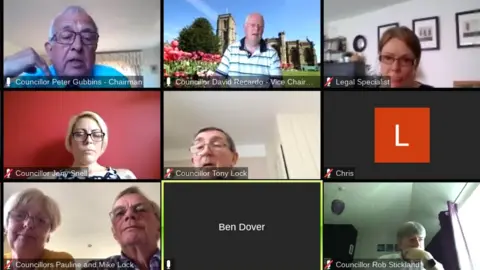Somerset planning meeting interrupted by pornography noises
 Zoom
ZoomAn online council meeting was disrupted by someone playing sounds from a porn film.
South Somerset Council held its first virtual planning meeting, with the public able to log in and watch proceedings.
But discussions were interrupted by people joining under suggestive names or using abusive language.
The council said it would not let a minority of "trolls" stop it holding further online sessions.
Held via online meeting website Zoom, the planning committee's deliberations were plagued by interruptions including people joining under suggestive names.
At one point, audio from a pornographic film could be heard, and homophobic language was also used by one online user.
Allow X content?
In a statement the council said it would take action to ensure future meetings were not disrupted.
"Unfortunately, the meeting was initially disrupted by a small number online trolls who used homophobic, misogynistic and appalling language which will not be tolerated," it said.
"We were, however, able to conduct a successful meeting with a number of members of the public able to participate and contribute.
"We will learn from this process and quickly review how the public can access and be part of future meetings."

BBC Somerset reporter James Craig
We're all having to do things differently at the moment, and that includes local authorities.
This was South Somerset District Council's first virtual meeting - it had posted on its website details of how people could join in.
The problems came when several members of the public interrupted councillors, swearing and using homophobic language.
The problems were resolved fairly swiftly, and several councillors noted that the virtual "attendance" was higher than most in-person meetings.
But this kind of problem poses a question about how councils can make sure their democratic processes remain open while not getting derailed altogether.
